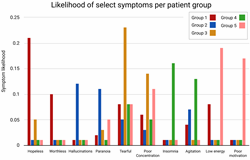
This graph shows the likelihood of each symptom of depression appearing in each of the five subtypes identified.
The team led by Prairie Health researchers applied natural language processing techniques and machine learning algorithms to a massive repository of psychiatric notes. The result of this novel approach was the discovery of 5 clinically-relevant subtypes of depression.
SAN MATEO, Calif. (PRWEB)
November 22, 2021
Affecting more than 264 million people every year, depression is a leading cause of disability worldwide. A key characteristic of depression is just how different symptoms can manifest for different people, both in severity of symptoms and type of symptoms experienced. For example, one person may experience hopelessness and insomnia, while another may experience low motivation and difficulty concentrating. A doctor might diagnose both as having depression.
The differences are rarely as distinct as that between individuals, but it’s these differences that lead to challenges both during treatment and progress tracking. There are accepted tools to measure depression with its subtypes like the Patient Health Questionnaire-9 (PHQ-9), but these inputs aren’t consistently tracked and don’t capture the full range of symptoms in a disease as heterogeneous a disorder as depression.
There is, however, a rich, untapped resource that describes depression symptoms in great detail: clinician notes. During most visits with patients in the medical setting, mental health providers like psychiatrists record notes from patients’ appointments, describing changes in appearance, mood, affect, emotions and more. While much more descriptive than questionnaires like the PHQ-9, the challenge is parsing and comparing notes from one doctor to another and analyzing these records across a population.
That’s where researchers at Prairie Health, a mental health technology company, come in, developing a novel technique to extract information from clinician notes, in a new paper in Nature Scientific Reports.
In partnership with the United Kingdom’s National Health Service (NHS), the team applied natural language processing techniques and machine learning algorithms to a massive repository of psychiatric notes from medical centers in the UK. The result of this novel approach was the discovery of 5 clinically-relevant subtypes of depression.
Benson Kung, lead author for the study and co-founder of Prairie Health, emphasized the importance of the type of data used for this analysis. “It is one thing to develop the machine learning methods but it is critical to have access to longitudinal, comprehensive clinical data like what’s found in NHS’s records. This allows us to learn about the patient from what their care providers are saying in free text rather than always relying on questionnaires.”
What makes these subtypes especially important is their clinical relevance. The researchers found that these additional characterizations were predictive of the future course of illness. This means clinics and health plan managers could more easily identify depressed individuals who could benefit from specific interventions suited to that subtype. When coupled with other sources of information, such as formal symptom assessment, this strategy holds promise of making treatment plans more personalized and effective, as compared to the one-size-fits-all approach to the treatment of what is a heterogeneous disease.
“The beauty of this study is that it uses automated techniques that could be widely implemented, allowing for future analyses in more varied populations and settings” commented Maurice Chiang, CEO. “Prairie’s vision is to use data to rapidly find the best treatment possible for an individual in order to minimize the suffering and disability associated with mental illness.”
Read the full paper here: https://www.nature.com/articles/s41598-021-01954-4
About Prairie Health
Prairie Health is a technology company on a mission to reduce all barriers to mental healthcare and modernize treatment, achieved by creating measurement-based and data-driven tools that improve access and outcomes. Prairie helps people with conditions like depression and anxiety get the best possible care by offering convenient appointments with top mental health providers, genetic testing to guide treatment choice, medication delivery, care coordination, and personalized outcomes tracking.
Share article on social media or email:

